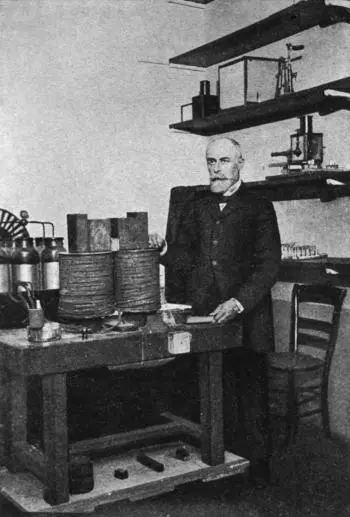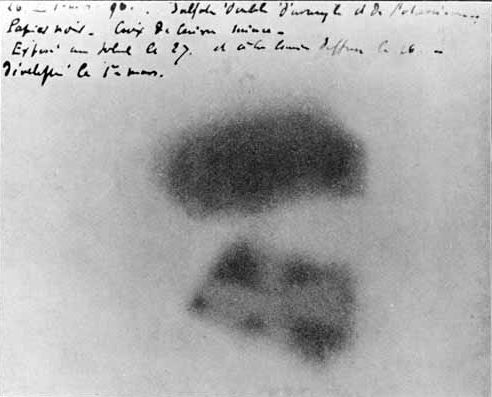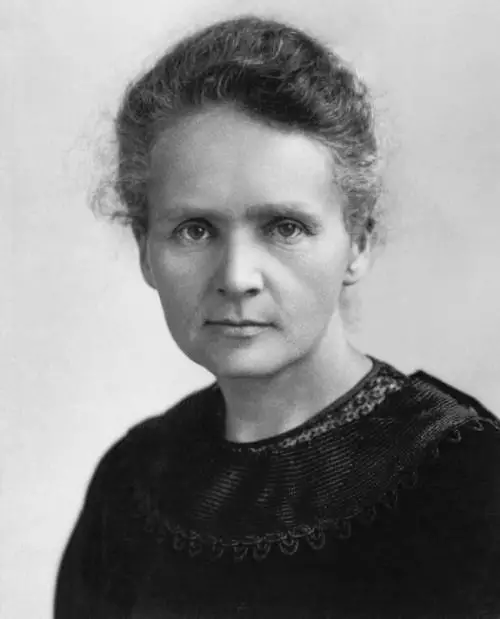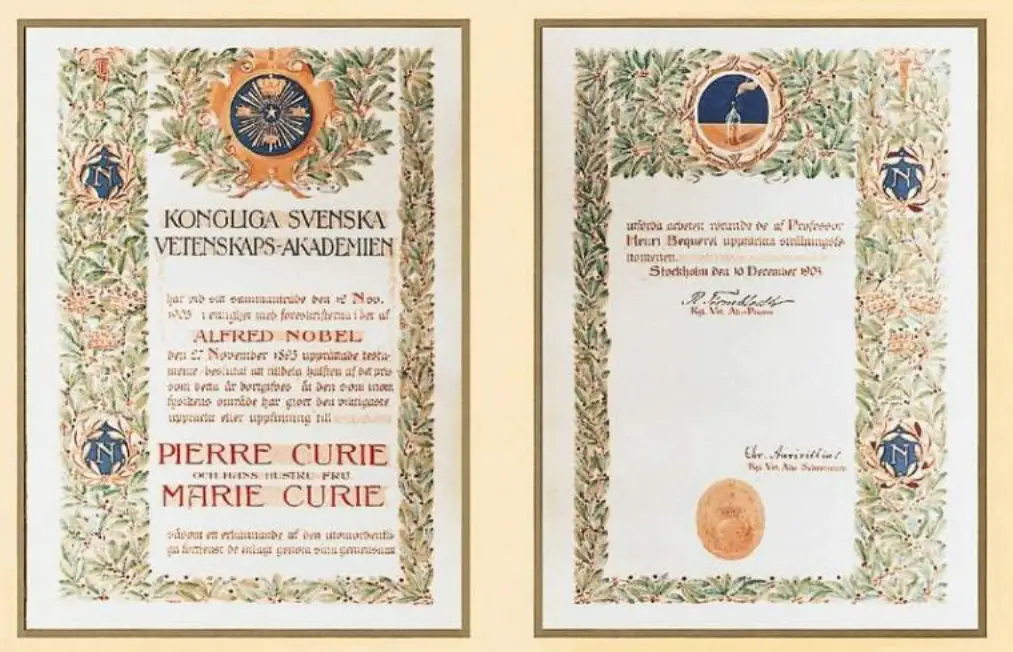
Radioactivity is a natural phenomenon in which certain unstable atomic nuclei emit radiation, which can be in the form of subatomic particles or electromagnetic energy, such as gamma rays.
But who was the pioneer behind the discovery of radioactivity? The discovery of radioactivity is mainly attributed to two pioneering scientists: Henri Becquerel and Marie Curie.
The mysterious discovery of Henri Becquerel
In the early 19th century, scientists were intrigued by strange properties observed in certain minerals, such as pitchblende and autunite.
These minerals seemed to emit invisible radiation that could affect photographic plates, suggesting the existence of a completely new phenomenon.
Becquerel experiment
At the end of the 19th century, Antoine Henri Becquerel began working with the theory that minerals were capable of emitting phosphorescent light. Phosphorescence is the ability of a crystal to absorb light and then re-emit it in the dark.
To verify his theory he performed an experiment: wrapping a photographic plate in black paper (to protect it from direct light), placing a phosphorescent uranium mineral on it, and exposing it to bright sunlight. When it was developed, the plate had a clear image of the uranium mineral. Initially, he thought of this as confirmation of his theory.
The experiment took place in February in Paris when the sky happened to be cloudy. With the lack of solar radiation he could not continue with his experiment, so he decided to keep the piece of uranium and the wrapped photographic plate in a drawer.
A surprising discovery
 Days later he recovered the materials to restart the experiment. Becquerel expected the plate to appear with a small amount of phosphorescence as a result of phosphorescence that had not yet faded. However, Becquerel found that the printed image was as intense as in the original experiment with solar radiation.
Days later he recovered the materials to restart the experiment. Becquerel expected the plate to appear with a small amount of phosphorescence as a result of phosphorescence that had not yet faded. However, Becquerel found that the printed image was as intense as in the original experiment with solar radiation.
The surprise was enormous and allowed Becquerel to come to the correct conclusion that this had nothing to do with light. Instead, the exposure came from the uranium itself, even in the dark.
Radioactivity had been discovered. He went on to demonstrate that uranium minerals were the only phosphorescent minerals that showed this effect.
Marie Curie: the woman who defined radioactivity
 It was at this crucial moment that Marie Curie entered the scene. Born Maria Skłodowska in Warsaw in 1867, Marie Curie was a passionate and curious scientist.
It was at this crucial moment that Marie Curie entered the scene. Born Maria Skłodowska in Warsaw in 1867, Marie Curie was a passionate and curious scientist.
She moved to Paris to study at the Sorbonne, where she met Pierre Curie, a prominent physicist whom she married in 1895. Together, they began a scientific collaboration that would change history.
Marie Curie was intrigued by Becquerel's experiments and decided to investigate the radioactivity of uranium minerals more systematically.
Working in a small laboratory, the Curie couple carried out meticulous experiments to understand the nature of the radiation emitted by radioactive minerals. They discovered that this radiation did not depend on temperature, pressure or the chemical form of uranium, making it truly mysterious.
The birth of radioactivity
Marie Curie coined the term "radioactivity" to describe this phenomenon, and together with Pierre, they began to isolate and study the radioactive elements present in uranium ores.
Their hard work led to the discovery of two new radioactive elements: polonium and radium. Marie Curie named polonium after her homeland, Poland, and radium after its intense radiation.
The process of isolating these elements was laborious and dangerous, as the Curies had to handle considerable quantities of highly radioactive substances without current knowledge about the risks of radiation exposure.
Despite the dangers, their dedication to scientific research encouraged them to continue.
International recognition and personal risks
The Curies' work not only included the discovery of new elements, but also the detailed study of their properties. These radioactive elements turned out to have applications in medicine, especially cancer therapy, and in industry, where they were used in luminescent watches and other devices.
However, over time, the danger of prolonged exposure to radiation became better understood, leading to a change in public perception of radioactivity.
The legacy of the Curies
 Marie and Pierre Curie's perseverance and dedication to their scientific research earned them international recognition. In 1903, the Curie couple shared the Nobel Prize in Physics along with Henri Becquerel for their pioneering work in the field of radioactivity.
Marie and Pierre Curie's perseverance and dedication to their scientific research earned them international recognition. In 1903, the Curie couple shared the Nobel Prize in Physics along with Henri Becquerel for their pioneering work in the field of radioactivity.
With this, Marie Curie became the first woman to win a Nobel Prize, and later, in 1911, she won a second Nobel Prize, this time in Chemistry, for her research on polonium and radium.
Despite the honors and recognitions, the life of the Curies was full of challenges and difficulties. Continued exposure to radiation took a personal toll on the couple, and Pierre Curie tragically died in a traffic accident in 1906.
Despite this loss, Marie Curie continued her scientific work and became a tireless advocate for scientific research and education.
The Legacy of the Curies in Modern Science
Today, radioactivity remains a crucial field of study in nuclear physics and medicine.
Numerous elements have been discovered and applications have been developed ranging from nuclear energy generation to positron emission tomography (PET) in medicine.
However, the importance of Marie and Pierre Curie in the discovery and initial understanding of radioactivity should never be overlooked.
Causes of the death of Becquerel and Marie Curie
At that time, the effects that radioactivity would produce on human health were not yet known, so continued exposure to radioactive sources seriously deteriorated the health of both scientists.
Henri Becquerel
Henri Becquerel died on August 25, 1908 due to a disease called "fulminant apoplexy" or "hemorrhagic stroke." At that time, no direct connection had been established between his work with radiation and his health.
Although it is now suspected that his prolonged exposure to radioactive materials could have contributed to his death, this was not confirmed at the time.
Marie Curie
On the other hand, Marie Curie died on July 4, 1934 due to complications from aplastic anemia, which is believed to have been caused by her chronic exposure to high levels of radiation during her scientific research.
Throughout her career, Marie Curie worked under safety conditions that were far less stringent than what would be considered safe today, repeatedly exposing her to radiation.
Although the risks associated with radiation were not fully understood at the time, as in Becquerel's case, it is believed that his exposure contributed to his deteriorating health and, ultimately, his death.